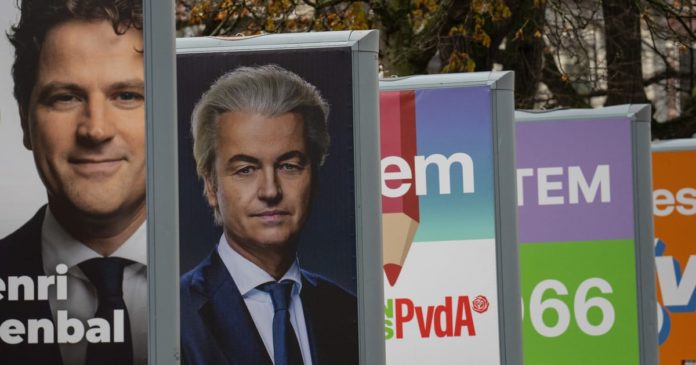ROTTERDAM, Netherlands — A sudden surge in support for far-right firebrand Geert Wilders has electrified the Dutch election as the campaign enters its final hours.
Wilders’ anti-Islam and anti-EU Freedom Party (PVV) has been buoyed by last-minute gains, with one poll even putting the PVV tied for first place with the conservative-liberal VVD party of outgoing Prime Minister Mark Rutte.
The late shift in the polls has thrown the Dutch race into dramatic flux. Voters cast ballots on Wednesday to choose all 150 members of parliament, with the results expected later that night.
Until the last few days, the contest had been a three-way affair since its July start, with Rutte’s incumbent VVD slugging it out with a Labour-Green alliance headed by EU heavyweight Frans Timmermans, and with the newly-formed center-right party of outsider Pieter Omtzigt.
The new leader of Rutte’s party, Dilan Yeşilgöz, said early in the campaign that she would not, unlike Rutte, exclude the PVV from coalition negotiations. Since then Wilders has taken a more moderate tone, saying he’s “available” for coalition talks.
His anti-Islam rhetoric, however, is still very much part of the PVV’s election program. The party wants to ban mosques and the Koran, and forbid Islamic headscarves in government buildings. Wilders is also a hardline euroskeptic, calling for a referendum on leaving the EU.
Comeback king
If Wilders’ party wins the most seats in the proportional representation vote, it would rock the Netherlands.
The PVV leader has been railing against Islam for more than 15 years since launching his party in 2006. He is one of the senior figures in the European far right, a political friend of Hungary’s Viktor Orbán and Marine Le Pen in France. Several years ago he was convicted by a court for insulting a group of people based on their background after calling for “fewer Moroccans” in a 2014 speech.
In 2017, international media descended on the Netherlands amid speculation that the country might become the third domino to fall to nationalist populism following the vote for Brexit in the U.K. and the election of Donald Trump in the U.S. A “Wilders effect” was even invoked to explain how his political language and beliefs had shifted mainstream discourse to the right.
A veteran of The Hague, Wilders is a strong debater who is quick on his feet. During a debate on Monday, he was asked what he would say to the international students in the audience whose presence in the Netherlands he wants to limit. He turned to the audience and asked in a strict tone: “Where are they?”
His extreme views also mean he has needed 24-hour police protection for more than a decade after his name was found on a hit-list of Islamist terrorists linked to the 2004 killing of film director Theo van Gogh. Wilders and his wife have been living in safe houses since then.
NETHERLANDS NATIONAL PARLIAMENT ELECTION POLL OF POLLS
For more polling data from across Europe visit POLITICO Poll of Polls.
Wilders’ inflammatory politics have not only divided the Netherlands but also split his own family. His brother has urged people not to vote for him, and revealed they have cut ties. Abroad Wilders is a disrupter as well, banned from entering the U.K. in 2009 after the British government ruled he was an “undesirable person.”
In Dutch politics, Wilders was more recently challenged — briefly — by younger far-right figures, including Thierry Baudet whose Forum for Democracy topped the polls in 2019 provincial elections.
Earlier this year, Caroline van der Plas and her right-wing populist BBB Farmer-Citizen Movement stormed to victory in provincial elections, becoming the largest party in the upper house of the Dutch parliament. That momentum has faded, however, and the party is currently polling in sixth place.
The unexpected surge of public support for Wilders’ party was first reported by pollster Maurice de Hond, who overestimated Wilders’ share by five seats in the previous election. In a survey of almost 7,000 people on November 17, he found the PVV and VVD were neck-and-neck in 26 of the 150 seats up for grabs thanks to a five-seat surge by Wilders.
POLITICO’s Poll of Polls shows Yeşilgöz leading with 18 percent, followed closely by Wilders and Timmermans on 16 percent each and Omtzigt’s party on 15 percent.
Given that the differences between the rivals are so small, experts warn it’s impossible to predict which of the four parties will win.



